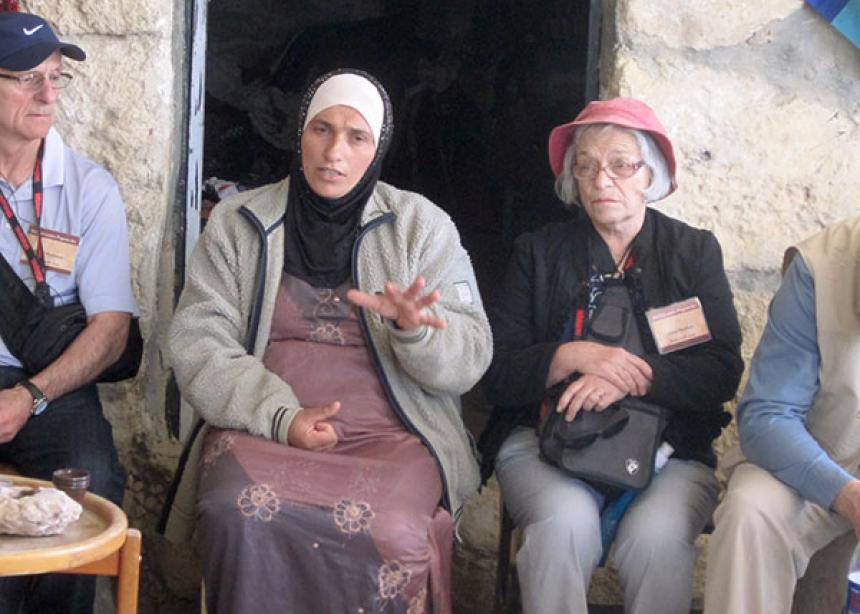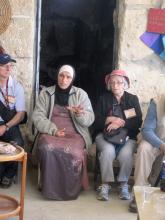“Have you ever watched those TV court programs where a witness is brought to the stand and asked to raise his hand and swear to tell the truth?” I ask my Israel-Palestine tour groups. I get knowing nods all around and inevitably someone completes the courtroom scenario by adding, “. . . the whole truth and nothing but the truth.”
“Why?” I retort with rehearsed surprise. “Isn’t the truth enough?”
But something suddenly dawned on me as I sat in the synagogue of a Jewish settlement in the West Bank near Bethlehem. Friday morning prayers had ended an hour earlier and a few black-draped men still bobbed their recitations of Torah facing Jerusalem. As we often do, we came to hear an educated professional man who has lived in the settlement with his family for more than 20 years.
He passionately defended his choice in what many consider an “illegal” settlement. “I know about pacifist Mennonite attitudes,” he informed our group. “And, no doubt, your Arab family hosts last night told you all about horrible things we do and why we shouldn’t be living here. Or why they hate that security wall you drove through this morning.”
But when our group continued the discussion with reference to their conversations with soldiers at checkpoints, meeting with Muslim women in the Hebron Hills village who lived under the constant harassment of the radical Israeli settlement beside their fields, or listening to a Palestinian farmer’s frustration over losing access to fresh water on his land now controlled and charged for by the Israeli military authorities, the speaker denied any knowledge of them and disparagingly suggested we were unwitting victims of stories from isolated activists.
He was certain that our accounts of illegal arrests and lengthy detention by residents of Palestinian villages were deliberately overstated to gain our sympathy. He claimed no knowledge of “any real problems for the majority of Palestinians” in getting access to jobs, medical services or travel freedoms, “except for a few trouble-makers who were understandably restricted from leaving their villages.”
It was clear that he had not travelled to many of the places we did, had not spoken with people living under occupation, and was not too interested in hearing their life stories. He insisted he had the accurate Israeli account. He was telling the truth.
But the accounts remained so different, it was as if there was a wall between them.
What dawned on me was that maybe he was wrong about something pretty basic. While we indeed were on a brief learning tour and lacked some of the background historical issues that affect much of the Middle East reality, our personal visits and conversations with people from many perspectives and experiences across Israel and Palestine, on both sides of the Separation Wall, gave us first-hand input. We could see with our own eyes the situations our speaker only read about and dismissed. We met in person with those who lived a daily life of oppression under occupation, people whom he ignored and denigrated.
As an Israeli, he was forbidden to cross into Palestinian territory, but spoke of things he knew. But there was clearly more to know. We had seen and heard it, and weighed the opposing accounts. What he lacked was the whole truth, and that made the difference.
Glenn Edward Witmer is the leader of MennoJerusalem Tours to the Holy Land.
--Posted Oct. 8, 2014




Add new comment
Canadian Mennonite invites comments and encourages constructive discussion about our content. Actual full names (first and last) are required. Comments are moderated and may be edited. They will not appear online until approved and will be posted during business hours. Some comments may be reproduced in print.